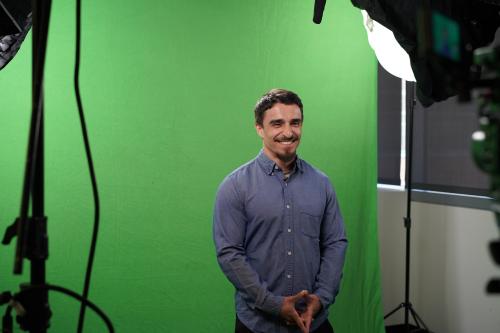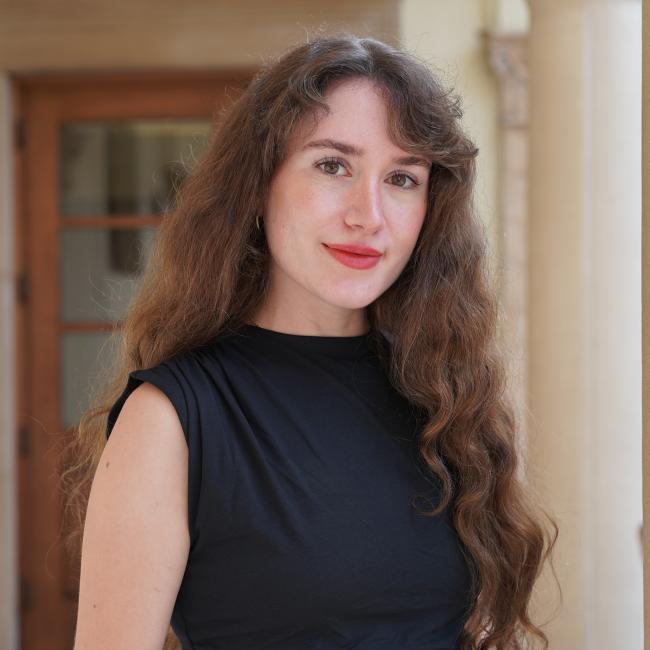
Science elevator pitches: Watch our trainees and faculty communicate their research in one minute
Each year, we challenge a group of our scientists to present their often-complex research in jargon-free, everyday language during a one-minute elevator pitch on camera.
It’s a required activity for graduate students, post-docs and clinical fellows in our Stem Cell Training Program because we believe in the importance of cultivating scientists who can communicate their research and why it matters to people of all ages, backgrounds and fields. As for the faculty who participate: they’re just good sports.
The topics covered range from using lab-grown 3D brain organoids to study neurological conditions to engineering powerful immune cells to develop more effective and affordable cancer therapies.
Watch the science elevator pitches below:
Natella Baliaouri, a graduate student in the lab of Bennett Novitch, Ph.D.
Using 3D Mini-Brain Organoids to Study Mysterious Rett Syndrome
Natella Baliaouri is using lab-grown mini-brains to study Rett syndrome, a rare genetic neurological disorder that severely impacts a child’s ability to speak, eat, walk and even breathe. These 3D brain models grown from patient stem cells offer scientists a unique window into the developing human brain to uncover the root causes of neurological conditions like Rett syndrome and test potential new therapies.
Clara Cano, a graduate student in the lab of Kathrin Plath, Ph.D.
New Therapies for Female-Specific Diseases
Clara Cano is using stem cells to study the process a special molecule called Xist undergoes to turn on and turn off X-linked genes. Her work is crucial in understanding the earliest stages of human development and is laying the groundwork for new therapies for female-specific diseases.
Yanruide (Charlie) Li, Ph.D., a post-doc in the lab of Lili Yang, Ph.D.
Engineering Powerful Immune Cells for Affordable Cancer Treatments
Dr. Yanruide (Charlie) Li is engineering powerful immune cells that can be used for an “off-the-shelf” cancer immunotherapy in which immune cells from a single donor can be used to treat multiple patients. This novel technology marks a key step toward the mass production of cell therapies, which will significantly lower the cost of these life-saving treatments.
Tyler McCaw, M.D., Ph.D., a clinical fellow in the lab of Joseph G. Crompton, M.D., Ph.D.
Harnessing Stem Cells to Boost Cancer-Fighting Immune Cells
Dr. Tyler McCaw is pioneering the use of stem cell technologies to rejuvenate a patient's own cancer-fighting immune cells. By collecting these cells from surgically removed tumors, expanding and revitalizing them in the lab, and reintroducing them to the patient, the goal is to create a long-lasting, powerful defense against cancer.
Christopher Ochoa, a graduate student in the lab of Sanaz Memarzadeh, M.D., Ph.D.
Innovating Therapies for Aggressive Gynecologic Cancers
Christopher Ochoa is dedicated to developing breakthrough treatments for gynecologic carcinosarcomas — highly aggressive and deadly cancers of the uterus and ovaries. His research focuses on identifying vulnerabilities in the tumor cells to pave the way for more effective, targeted therapies.
Kuangyi Zhou, a graduate student in the lab of Lili Yang, Ph.D.
Revolutionizing Cancer Treatment With Engineered Immune Cells
Kuangyi Zhou uses stem cell engineering to generate powerful immune cells to treat cancer. These engineered immune cells are highly effective and safe in targeting cancer.
Melissa J. Spencer, Ph.D., professor of neurology
Advancing Gene Therapies for Muscular Dystrophies
Dr. Melissa J. Spencer is at the forefront of developing gene therapies aimed at correcting the underlying genetic causes of neuromuscular diseases such as Duchenne muscular dystrophy, the most common fatal childhood genetic disease.
Michael F. Wells, Ph.D., assistant professor of human genetics
Exploring Genetic Influences on Brain Disorders
Dr. Michael F. Wells seeks to explain how our genetic differences shape our susceptibility to neurodevelopmental disorders. His innovative use of “cell villages” — clusters of cells from diverse individuals — aims to uncover the genetic mechanisms behind conditions like autism, intellectual disability and schizophrenia. By identifying biomarkers and understanding these mechanisms, his work could pave the way for personalized, preventative and therapeutic treatments.
